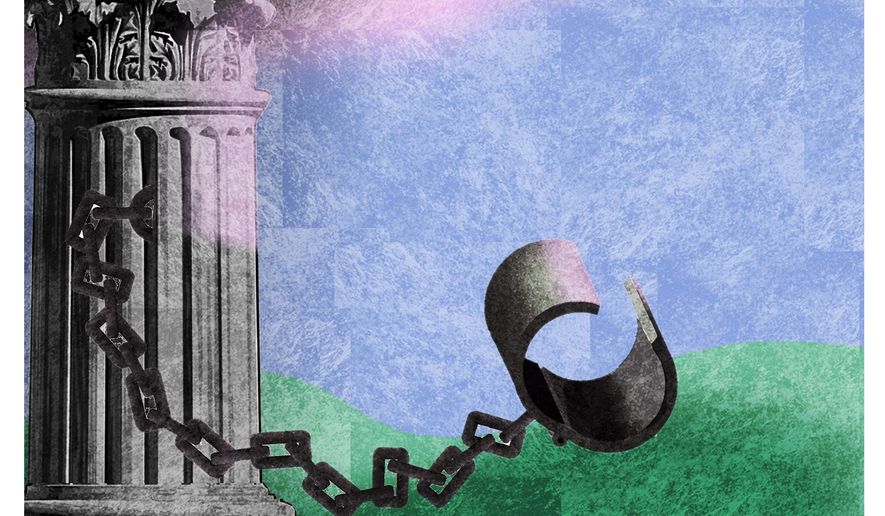OPINION:
What if we all start a return to normal life now that the government says the worst of the pandemic is behind us? What if we all make conscious choices to move about as before or to stay sheltered, based on our own exercise of our own informed free wills and not on the basis of governmental edicts? What if each of us decides if it is healthier to breathe in fresh air from outside or recycled air from under a mask?
What if massive numbers of us make these decisions on our own?
What if the governors’ edicts don’t really carry the force of law? What if governors have assumed the power to tell us how to live from either out of thin air or from unconstitutional and outdated state laws?
What if it is profoundly unconstitutional for a state legislature to give its law-making powers to the state’s governor? What if, when that happens, all the governors’ edicts based on that attempted passage of power are null and void? What if we simply behave in a manner that shows we understand that these edicts are unlawful?
What if high school and college athletes play their fall sports without regard to gubernatorial edicts? What if public school superintendents and college and university presidents open up outdoor venues for folks to decide on their own whether they want to stay home or come out and watch a football game or a soccer match?
What if the police, many of whom have school- and college-age children, cheer on the athletes and join the observers at these games? What if they do so notwithstanding any commands from their superiors because these commands are unlawful, and they know it is unlawful to obey an unlawful command?
What if restaurants served their full complement of customers and folks became so happy that restaurants were again jammed? What if restaurant owners and customers made these choices on their own?
What if small businesses borrow money from banks — flush with cash because interest rates are so artificially low — and use those funds to restart their businesses? What if customers of those businesses choose to patronize them? What if shopping malls reopened and permitted folks to walk wherever their fancy took them?
What if fire and police and EMS and health care workers all joined in a mass exposition of personal liberty in our once-free society? What if the governors who have restrained us lose so much support that only the folks whom they have frightened to death listen to them? What if this resurgence of freedom uplifts our spirits, reunites us as a nation and is a step toward the realization of our rights to life, liberty and the pursuit of happiness?
What if — as Thomas Jefferson wrote in the Declaration of Independence — our rights to life, liberty and the pursuit of happiness are inalienable? What if an inalienable right can only be taken away in a free society for violating someone else’s rights, and only after a conviction by a fair jury trial? What if an inalienable right — sometimes called a natural right — cannot morally or constitutionally or legally be taken away by a governmental edict or by legislation or even by a referendum?
What if inalienable rights are integral to each person’s humanity?
What if the whole purpose of an independent judiciary is to be anti-democratic? What if its purpose is to preserve and protect the life, liberty, property and pursuit of happiness of those whom the government targets because it hates or fears them?
What if life, liberty and the pursuit of happiness were not just Jefferson’s musings for a free people but are the bedrock moral, constitutional and legal values of America, established in 1776, renewed whenever any government employee — from janitor to president — takes an oath of office, and are the foundation of all American laws?
What if each person’s right to life, liberty and the pursuit of happiness is each person’s choice as to the exercise and pursuit of those rights?
What if we have other inalienable rights such as the freedom of speech, the right to assemble peacefully, the right to worship, the right to travel and to self-defense, the right to fairness from the government, the right to take chances, the right to own and enjoy property and the right to be left alone?
What if government workers join in a massive civil disobedience of local and state rules governing personal behavior on private property? What if the governors who have been controlling us realize that they have no real support and thus have become toothless?
What if when government fails to protect inalienable rights, we simply ignore it?
What if ignoring the government is a pipe dream? What if most folks are afraid of the government? What if only a few in government take seriously the lofty language about the government deriving all its just powers from the consent of the governed?
What if the government uses force to enforce its unlawful decrees? What if the government uses each crisis to expand its power? What if when the crisis passes, the government retains the power it took during the crisis? What if the history of American government is the history of governmental power growing and personal liberty decreasing?
What if we ignore the government at our peril? What if when government tramples our rights, we alter or abolish it? What if the time to do that is coming? What if that time is here? What if — as Jefferson wrote — when the people fear the government there is tyranny? What if when the government fears the people, there is liberty?
• Andrew P. Napolitano, a former judge of the Superior Court of New Jersey, is a regular contributor to The Washington Times. He is the author of nine books on the U.S. Constitution.




Please read our comment policy before commenting.